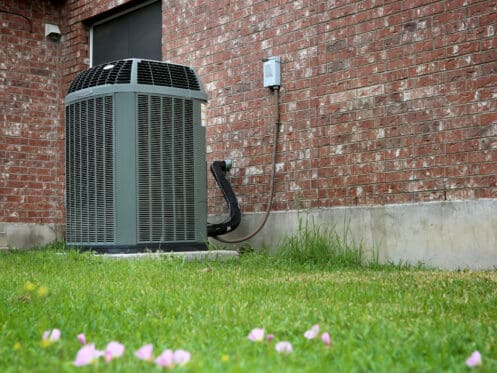Your HVAC system plays a big role in maintaining a comfortable and healthy indoor environment. It is normal for HVAC units to have issues over time because they start to age and begin to lose efficiency. Recognizing early signs of trouble with your HVAC system helps prevent minor problems from turning into major repairs or even system failures. Our team at First Choice Plumbing, Heating & Air Conditioning made a list of obvious signs that your HVAC system needs immediate attention so that you know when it’s time to reach out and get help.
1. Unusual Noises
Unusual noises coming from your HVAC system, such as squealing, banging, or grinding, often indicate loose parts or other mechanical issues. Squealing noises, for instance, may mean that the HVAC system has a problem with a belt or motor bearings, while grinding sounds may also mean motor bearings or other internal components aren’t working properly. Banging coming from an HVAC system could mean that there is debris in the system or parts are loose or broken. These sounds are not typical and are worth addressing right away to find out the problem and get it repaired. Regular maintenance is a good way to help prevent these unusual noises.
2. Poor Airflow
Serious issues like poor airflow could mean that your HVAC system has a clogged air filter, a failing blower motor, or there is an obstruction in the ductwork. A dirty air filter can restrict air movement, which reduces system efficiency and causes components to overheat. A failing blower motor may struggle to circulate air effectively, which may lead to uneven heating or cooling. If there is a blockage in your home’s ductwork, such as debris or a closed damper, this will also impede airflow. These issues can compromise the level of comfort in your home and put a strain on your HVAC system.
3. Inconsistent Temperatures
If you notice inconsistent temperatures in your home, this suggests that there are issues with the HVAC system air distribution or thermostat. Poor air distribution can be because of imbalanced ductwork, obstructed or closed vents, or failing components. A malfunctioning thermostat may also incorrectly signal the system, causing a potential for uneven cooling or heating. Insufficient insulation or air leaks in your home may also contribute to inconsistent temperatures. Addressing these issues is important for making sure the HVAC system in your home operates well.
4. Frequent Cycling
When your HVAC system short cycles or cycles frequently, this often indicates underlying issues like a malfunctioning thermostat, an oversized system, or refrigerant leaking issues. A faulty thermostat may read the temperature inaccurately, causing the system to turn on and off repeatedly. Low refrigerant levels may also lead to short cycling, which can prevent the system from reaching the desired temperature. If the unit is too large, it can heat or cool the space too quickly, which may lead to frequent cycles.
5. High Energy Bills
If you notice a quick spike in the energy bills for your home but usage is normal, this may be a sign that the HVAC system in your home isn’t running efficiently. This inefficiency can result from many issues, such as dirty coils, clogged filters, or refrigerant leaks. Dirty coils may hinder heat exchange, making the system work harder. Clogged filters can also restrict airflow, which causes the system to use more energy. Issues with refrigerant may cause the HVAC system to work harder, which uses more energy. Regular maintenance can help ensure the best performance for your HVAC system and correct unexpected increases in the energy bills for your home.
6. Smelling Unpleasant Odors
Unpleasant odors that come from your HVAC system can indicate major issues such as electrical problems, mold growth, and leaks. Musty smells often are a result of mold or mildew growing in the ducts or unit of your home. This may potentially cause health issues and make your environment uncomfortable. Burning odors can signal overheating components for electrical issues that could lead to a fire hazard. Chemical smells might indicate a refrigerant leak. These odors can be harmful if inhaled, so it’s important to get them inspected promptly.
7. Excess Humidity
Excess humidity in your home, when running your HVAC system, may indicate that there are problems with the system’s dehumidification process. The evaporator coil plays a role in removing moisture from the air, and issues such as dirt buildup or malfunctions can cause problems with effectiveness. When the coil is dirty, it can’t absorb heat well, which leads to poor moisture removal and higher indoor humidity levels. Also, if the HVAC system is the wrong size, this can make humidity problems worse. An oversized unit may cool the air too quickly, without running long enough to dehumidify it properly. An undersized system may struggle to keep up with the demand, leaving more moisture in the air.
High indoor humidity levels can lead to various issues beyond discomfort. This can create an environment that is conducive to mildew and mold growth and lead to health problems such as allergies and respiratory issues. Mold can also spread quickly and damage your home and furniture. High humidity may also lead to the increase of dust mites and bacteria, which leads to worse indoor air quality.
8. Water Leaks
Water leaks around your HVAC system are a clear indication of a problem that needs addressing right away. This leak may be a sign of a blocked drain line, issues with a pump, or refrigerant leaks. The clogged drain line prevents water from properly draining away, causing it to back up and overflow, which leads to puddles around the unit.
Refrigerant leaks can also result in excess moisture accumulation as a system struggles to maintain the proper cooling levels. Problems with a condensate pump, which is responsible for removing excess water, may lead to water pooling around the HVAC system. Water leaks are not only a signal of your system malfunctioning, but they can also cause damage to your home and compromise indoor air quality.
9. System Age
The age of your HVAC system impacts its performance and efficiency. Most systems last around an average of 20 years, but they can last up to 30. As HVAC systems age, components start to wear out, and they often rely on outdated technology, making them less energy efficient. If you have concerns about the energy efficiency of your HVAC system or you want to experience newer technology, you may want to consider getting a newer HVAC system.
As a general rule, regular maintenance can help extend the lifespan of your HVAC system. You may notice that you are starting to make frequent repairs to the HVAC system in your home, especially if it quits working when you need it the most. Then you may want to think about getting a replacement.
Your Trusted HVAC Professionals
At First Choice Plumbing, Heating & Air Conditioning in Metuchen, New Jersey, we provide air conditioning, heating, and indoor air quality services for homes in the area. Our friendly team also provides oil-to-gas conversion, plumbing, and commercial services. Contact First Choice Plumbing, Heating & Air Conditioning for more information today!



